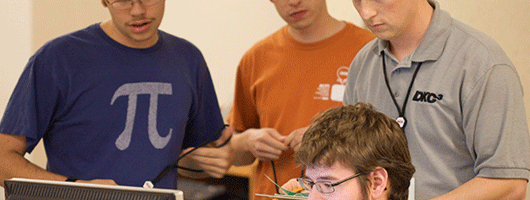 Bachelor of Science (B.S.) in Computer Science
Bachelor of Science (B.S.) in Computer Science
4-Year Degree Plan (Sample)
About the Bachelor of Science (B.S.) in Computer Science
The Bachelor of Science (B.S.) degree is appropriate for students interested in learning the principles, applications and technologies of computing and computers. It is a discipline that spans theory and practice with thinking in both abstract and concrete terms. The practical side of computing can be seen everywhere. Nearly everyone is a computer user. Receiving a BS in Computer Science enables a person to go beyond being a user and to learn software development. Computer Science, in its essence, can be thought of as problem solving. Computer scientists must be adept at modeling and analyzing problems and then to design and develop solutions. Finally, computer science has a wide range of specialties including computer architecture, software systems, graphics, artificial intelligence, database systems, security and many others.
Students planning to major in computer science should contact the department office before their first semester to schedule a meeting with an advisor. The advisor will help in developing a plan for their academic course of study.
Academic Advising
College policy on advising requires that students meet with their academic advisors at least once each year, and in some departments, prior to each semester's enrollment. Advising holds are placed on all CLAS students prior to advance registration and are reset following advising appointments. To determine who your assigned advisor is and how to contact them, see Onestart.
Degree Requirements (120 cr.)
Students receiving the B.S. in Computer Science must complete 120 total credit hours including:
- IU South Bend campuswide general-education curriculum (33-39 cr.)
Note | Critical Thinking | satisfied by CSCI-C C250 Foundation of Digital Computing, a required computer science course; Quantitative Reasoning | satisfied by required Mathematics courses; Computer Literacy | satisfied by required computer science courses. - Major requirements (must be completed with a grade of C-or higher)
- Minimum of 30 credit hours at the 300- or 400-level
- Additional and elective requirementsAll courses are 3 credit hours, unless otherwise stated.
Major Requirements (90 cr.)
Societal Issues in Computing (3 cr.)
- INFO-I 202 Social Informatics
World Languages (6 cr.)
- Two semesters in a single language, or equivalent (may be satisfied with language placement test and credit by examination)
Physical and Life Sciences (14 cr.)
- PHYS-P 303 Digital Electronics (4 cr.) (Includes a required laboratory component)
Select two options from the following:
Biology Option 1
- BIOL-L 101 Introduction to Biological Sciences 1 (5 cr.)
Biology Option 2
- BIOL-L 102 Introduction to Biological Sciences 2 (5 cr.)
Chemistry Option 1
- CHEM-C 105 Principles of Chemistry I
- CHEM-C 125 Experimental Chemistry I (2 cr.)
Chemistry Option 2
- CHEM-C 106 Principles of Chemistry II
- CHEM-C 126 Experimental Chemistry II (2 cr.)
Physics Option 1
- PHYS-P 201 General Physics 1 (5 cr.)
Physics Option 2
- PHYS-P 202 General Physics 2 (5 cr.)
Physics Option 3
- PHYS-P 221 Physics 1 (5 cr.)
Physics Option 4
- PHYS-P 222 Physics 2 (5 cr.)
Note | Credit not given for both PHYS-P 201 General Physics 1 and PHYS-P 221 Physics 1
Mathematics (13 cr.)
Note | A grade of C or higher in each course is required.
- MATH-M 215 Calculus I (5 cr.)
- MATH-M 260 Combinatorial Counting and Probability
- MATH-M 261 Statistical Inferences (2 cr.)
- MATH-M 301 Linear Algebra and Applications
Computer Science (47 cr.)
Note | A grade of C– or higher in each course is required. At least 22 of the 44 credit hours must be taken at IU South Bend.
- CSCI-B 401 Fundamentals of Computing Theory
- CSCI-C 101 Computer Programming I (4 cr.) (Test out is available)
- CSCI-C 151 Multiuser Operating Systems (2 cr.) (Test out is available)
- CSCI-C 201 Computer Programming II (4 cr.)
- CSCI-C 243 Introduction to Data Structures (4 cr.)
- CSCI-C 250 Discrete Structures
- CSCI-C 308 System Analysis and Design (4 cr.)
- CSCI-C 311 Programming Languages
- CSCI-C 335 Computer Structures (4 cr.)
- CSCI-C 435 Operating Systems 1 (4 cr.)
- CSCI-C 455 Analysis of Algorithms I
- Three additional computer science courses at or above the level of CSCI-C 243 Introduction to Data Structures. Select from the following:
- CSCI-B 424 Parallel and Distributed Programming
- CSCI-B 438 Fundamentals of Computer Networks
- CSCI-B 451 Security in Computing
- CSCI-C 442 Database Systems
- CSCI-C 463 Artificial Intelligence I
- CSCI-C 481 Interactive Computer Graphics
- CSCI-C 490 Seminar in Computer Science (1-3 cr.) (choose topics such as biomorphic computing, computer vision, advanced Java, or embedded systems)
- CSCI-Y 398 Internship in Professional Practice
- MATH-M 471 Numerical Analysis 1